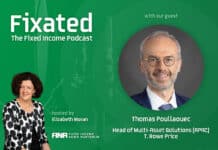
Following a year of high inflation, geopolitical turmoil and spiking energy prices, professional fund selectors are expecting more of the same in 2023, with 62% globally, and 74% in Asia, believing a recession will be absolutely necessary in order to get inflation under control, according to a survey from Natixis Investment Managers.
Natixis IM surveyed 441 professional fund selectors at firms managing over $30 trillion in total client assets, from leading wealth management, private bank, and insurance platforms around the world. When asked about the year ahead, inflation (70%) and interest rates (63%) continue to rank as the top portfolio concerns and a central bank error (52%) ranks as the biggest economic risk. Changing trade practices are also weighing on their minds, as 62% of professional fund selectors worry that the move from global trade to more domestic production and friend-shoring will hinder growth.
“Market conditions are volatile so it is very important investors review their investment portfolios and work with their financial advisers to ensure they are well positioned for growth, but also are protected as much as possible from the downside,” said Louise Watson, country head Australia and New Zealand, Natixis Investment Managers.
She added: “This may also mean revising expectations and making other adjustments to budgets to absorb the increase in the cost of living we are now experiencing and the sharp increases to the cost of borrowing following nine consecutive increases in interest rates.
“These risks all come at a time when the wealth management industry is facing dramatic changes, as investors seek more comprehensive financial planning services and firms work to tailor their offerings to meet the evolving needs of clients. As a result, selectors not only have to address the market challenges ahead, but also deliver new investment choices.
Also read: Is The Consumer About To Crumble?
“Despite the challenging outlook, professional fund selectors remain optimistic for the year ahead, with 73% saying they will maintain or increase average return assumptions of 8.8%.
“Though few believe they will need to make wholesale changes to portfolio strategy to achieve return expectations, they are planning small but significant shifts in allocations to navigate the uncertain economic and market environment.”
Shoring up client portfolios
While professional fund selectors see inflation as a key portfolio risk, they also see a potential opportunity in the interest rate hikes that come with it. Three-quarters believe that rising interest rates will usher in a resurgence in traditional fixed-income, with 51% saying they will increase investments in government bonds, and another 46% reporting they will increase allocations to investment grade corporates.
On the equity side, professional fund selectors appear to be relatively optimistic for 2023, as they look to shift equity weightings to capture the upside of market dislocations. Six in ten (59%) are bullish on stocks, 9% higher than institutional investors who were surveyed a month earlier*.
Professional fund selectors also plan to mitigate risk through the continued use of alternatives. Almost six in ten say they are recommending increased allocations in alternative investments due to higher levels of risk. Risk views run so strong that 63% say they believe alternative investments belong in retiree portfolios to help mitigate their exposures.
Within alternatives, professional fund selectors are most likely to increase allocations to infrastructure (48%), followed by private equity (43%), absolute return strategies (32%), and private debt (31%). When it comes down to it, 64% believe portfolios composed of 60% equities, 20% bonds, and 20% alternatives will outperform the traditional 60:40 portfolio in 2023.
Active management stands out in an uncertain market
Underpinning this, allocation calls show that selectors are looking to active investments as a critical tool for managing client portfolios in the current environment. 80% of professional investors say active management is necessary to find alpha during a recession, and 72% believe active investments will outperform passive.
Additionally, 54% of professional fund selectors anticipate that a recession will reveal key inadequacies of passive investments, and more than half (67%) worry that large flows in and out of passive investments will exacerbate already high levels of market volatility. This has prompted 59% of professional fund selectors to consider increasing allocations to active funds this year.
“In the prevailing market conditions, active investing is a useful strategy to allow portfolio managers the flexibility they need to seek out and respond to investment opportunities as they arise,” said Watson.
“Active management is a portfolio management style used by many Natixis Affiliates available to Australian investors including Investors Mutual Limited, Mirova, Loomis Syles, Flexstone and Vaughan Nelson. These market-leading fund managers aim to outperform benchmarks using the skill of their portfolio managers and bring to Australian investors local and international experience and expertise.”
Regulatory changes are driving interest in ESG
Sustainable investing is expected to see the biggest allocation increase in 2023, with 61% of professional fund selectors saying they will increase allocations, rising to 74% in EMEA where MIFID III requires all financial advisers to discuss sustainable investing with their clients. Only 48% of professional fund selectors in North America have plans to increase sustainable investments.
Many are also looking to private assets to enhance their sustainability offering, with 30% reporting that they will turn to private markets for impact investing. This is reflective of the broader trend towards private assets more generally. Even as the yield picture begins to change, 50% say they will add to their private investments offering and 44% believe private assets will provide a safe haven for investors.
Creating a more consistent investment experience
Model portfolios are growing in importance for professional fund selectors, as they look to manage client expectations and unify investment offerings, with 79% reporting that their firm offers some sort of model program.
82% believe models allow them to provide clients with a more consistent investment experience and 86% say models provide a streamlined approach. 76% also report that offering models to their clients helps manage their own risk exposure. ESG model capabilities will come into the spotlight in 2023, with almost half (49%) of professional fund selectors saying their firm plans to add sustainable portfolios to their offering.
As selectors look to grow their model offerings, they are also turning to third-party managers. Natixis’ past surveys show that selectors self-reported use of third-party managers has more than doubled in two years, rising from 11% in 2021 to 24% in 2023.
Martin Herbon, head of Global Financial Institutions, said, “Professional fund selectors have genuine concerns about what 2023 will bring, as they anticipate elevated levels of inflation, rising rates, and increased market volatility. They see rising rates as driving a resurgence for bonds and are reallocating their client portfolios accordingly, with sustainable investing expected to see the biggest allocation increase in 2023. Private assets are a class growing in popularity with half of selectors surveyed planning on adding to private investment offerings. In short, this year will be one of tactical shifts to generate income.”

































